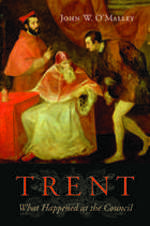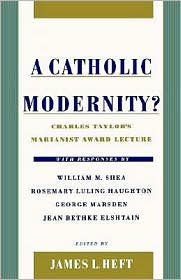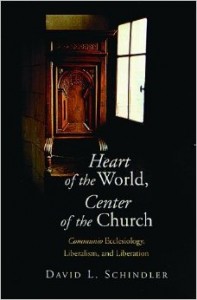Ross Douthat’s “The Pope and Precipice” has received plenty of attention of late. Rod Dreher presents it as an insightful piece and even invents a pithy Galatians 2 tag for it: resisting the pope to his face (while ignoring how Paul got into Peter’s face to argue for doctrinal development, or, even a break with the past practice of excluding Gentiles).
What I see in Douthat’s article instead is the specter of a shapeless, because baseless, fear.

First of all, nothing was decided at the Synod. What we see is the sausage being made up close in ways that weren’t possible before social media. Vatican I was a sausage factory, as I’ve mentioned elsewhere. But so was Paul opposing Cephas. The early Christians were probably not as heroic as we think of them and possibly doctored their accounts of martyrdom. Constantine adopting Christianity was its own mess, as was the takeover of the bishoprics by corrupt Roman aristocrats afterwards. The Byzantine side was, and still is, Byzantine (there so much more than 1054!). Douthat mentions the middle ages with the kind of aversion you’d expect from Zmirak. But it is true they were a mess, and what a productive one! Everything before, during, and after Trent followed the same pattern. There is not a period in Church history that exhibits the kind of neat conservative unanimity and equilibrium Douthat measures the Synod (so far) against.
Douthat’s argument about conservatives being the heart and center of the Church is an old one from his book Bad Religion. But why couch Church debate in inappropriate American political categories? The Neo-Conservative heroes of that book have done much to bravely defend the below the navel issues (BNIs), but they’ve done much more to hurt the Church by caving in to the American conservative consensus on economics and American war-making in ways that undermine the BNI issues in the long run. They undermine the BNI’s because their positions in other areas of life are so un-Christian that their BNI sincerity is hard to buy at face value. Why aren’t all these other issues deal-breakers, or schism-makers?
Now let’s suppose that we do have an easing up on BNI issues through gradualism, meeting people where they are, but still upholding the ideal for them. Does it have to lead to an unraveling like the mainline? Why can’t it be like Orthodoxy, which is much more conservative, not always in good ways, than Catholicism.
Furthermore, there is not a neat line between theological conservatism and orthodoxy. When it comes to the issues of doctrinal development, Rowan Williams has argued in his book Arius: Heresy and Tradition that Arius was the most conservative theologian at Nicea, whereas his orthodox opponents, in their formulations of doctrine, left the windows open for God’s grace to work.

As for total theological innovations or breaks (should there be one to issue from the Synod–we don’t know and it’s best to be agnostic about it)… there have been plenty in the West. The eventually usually are pressed into the category of doctrinal development. The imposition of universal priestly celibacy very late in Church history is one example. The break with the strict monotheism of Judaism with the formulation of the Trinity is another one; one which the faithful are still having trouble absorbing. On a subtler level, the move toward auricular confession and the encouragement to participate in it much more frequently (we’re not the only period with confession issues, if they really are that) changed Church practice to such an extent that Taylor argues in his A Catholic Modernity? it helped to usher in the development of the modern private and buffered individual.
On the moral level the Church has a long history of rejecting prudish moralism as heresy. Early on there were the holy-rollers of Montanism whose rigorism appealed to no less a figure than the first truly systematic Western Christian theologian, Tertullian. They eventually disappeared.
But more importantly for our purposes there were the Donatists (See: Peter Brown’s account in his biography of Augustine) who rejected the validity of the sacraments administered by priests who had repudiated their faith during the Persecution of Diocletian. Even though a commission appointed by Pope Miltiades ruled against the Donatists by taking something like a gradualist line. But the Donatists persisted, outnumbering the orthodox in many regions, proclaiming themselves as the true Church. Then they eventually died out.
Do we not see the same sort of divisive self-righteous moralism in the following (already apocalyptic) threat from Douthat?
SUCH a reversal would put the church on the brink of a precipice. Of course it would be welcomed by some progressive Catholics and hailed by the secular press. But it would leave many of the church’s bishops and theologians in an untenable position, and it would sow confusion among the church’s orthodox adherents — encouraging doubt and defections, apocalypticism and paranoia (remember there is another pope still living!) and eventually even a real schism.
Those adherents are, yes, a minority — sometimes a small minority — among self-identified Catholics in the West. But they are the people who have done the most to keep the church vital in an age of institutional decline: who have given their energy and time and money in an era when the church is stained by scandal, who have struggled to raise families and live up to demanding teachings, who have joined the priesthood and religious life in an age when those vocations are not honored as they once were. They have kept the faith amid moral betrayals by their leaders; they do not deserve a theological betrayal.

The real betrayal would be to give into Douthat’s directive of BE VERY AFRAID (sky is falling, schism broiling, institutional collapse is around the corner)!!!
It all reminds me too much of the automatic apocalyptic mind chatter (all those disastrous “what ifs” we keep replaying in our minds) Martin Laird deconstructs in his book about contemplation.
But is there not a much greater appeal in John Paul II’s “Be not afraid”?
This is from JPII’s homily for the inauguration of his pontificate:
Brothers and sisters, do not be afraid to welcome Christ and accept his power. Help the Pope and all those who wish to serve Christ and with Christ’s power to serve the human person and the whole of mankind. Do not be afraid. Open wide the doors for Christ. To his saving power open the boundaries of States, economic and political systems, the vast fields of culture, civilization and development. Do not be afraid. Christ knows “what is in man.” He alone knows it.
Recently C.C. Pecknold proposed the “Dominican Option” along the Polish pope’s open lines:
Dominic told his men to go into the world without fear. They should study, they should pray, and they should preach. His Order harmonized the life of a contemplative with the activity of an evangelist. This meant intellectual training. One only needs to think of St. Thomas Aquinas at the University of Paris to understand the impact this had. Dominicans studied other languages, and other religions, in order to preach more effectively. Aquinas himself wrote the Summa Contra Gentiles precisely to assist the brothers’ preaching to Muslims.
I only propose these things because Douthat’s choice of fear and retrenchment appeals to my own easily spooked personality. To be honest I’d rather hide behind the walls rather than raze the bastions, whether in religion or life, which amounts to the same thing.
What attracts me to the vision and practice of Francis, however it might play itself out in the Synod, is that he is not afraid to take on problems little old church ladies (and frankly the rest of us) only whisper about after Mass. Forget the conservative and liberal label-traps, there is something more profound going on here.
I seem to have read somewhere that fear is the opposite of hope. Fear seems to be the default setting of the human mind (or maybe only mine?). This why the vision of openness and hope offered by Francis is much more appealing to me than Douthat’s Donatist fear of contamination, sin, and change.
The whispers of fear should not have the final word (I keep repeating to myself):











